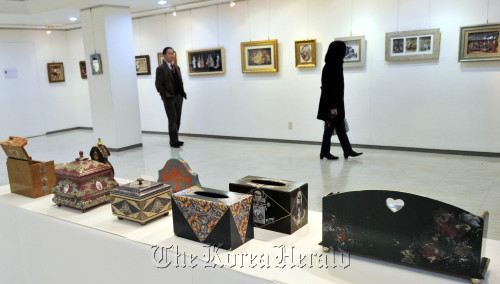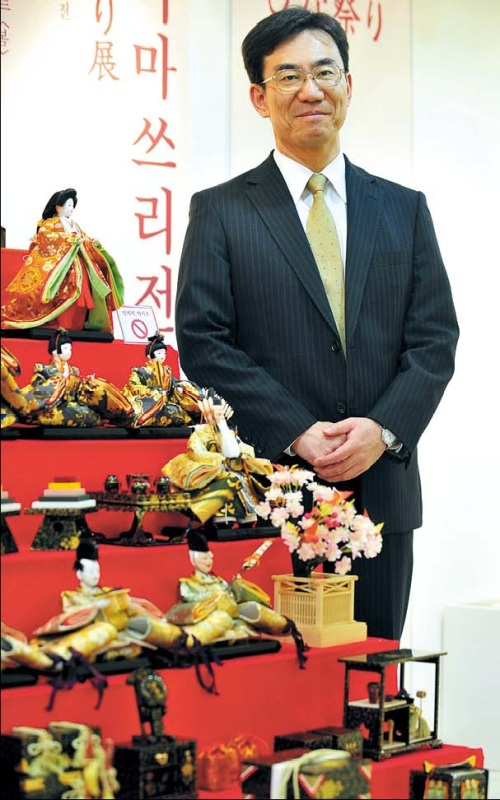Aside from pop culture, sharing of academic and artistic content also important: Director Michigami
This is the fifth of the series introducing cultural centers of different countries in Seoul. ― Ed.
As is evident from the popularity of Girls’ Generation and Jang Geun-suk, Japan has continued to be charmed by Korea’s popular culture ever since the mega hit TV series “Winter Sonata” captured Japanese hearts. In Seoul, on the other hand, it’s not hard to spot a number of shelves dedicated to Japanese literature at book stores, not to mention that two recent Korean films ― “Howling” and “Hwacha” ― are adaptations of bestselling Japanese novels.
However, Hisashi Michigami, the director of the Public Information and Cultural Center of Japan in Seoul, said more efforts are needed in both Korea and Japan to understand each other, aside from the two countries’ pop culture.
“Just because we watch a lot of YouTube videos of each other’s pop music, it doesn’t mean we know one another really well,” Michigami told The Korea Herald. “Scholarly and artistic activities are equally as important as pop culture for the two countries to share.”
Michigami, who speaks Korean fluently, has been working as the director since last year. He studied in Seoul from 1984 to 1986 at Seoul National University. Under his leadership, the cultural institute is planning to have many “inter-cultural” events this year, including the annual “Korea Japan Festival” in September.
This is the fifth of the series introducing cultural centers of different countries in Seoul. ― Ed.
As is evident from the popularity of Girls’ Generation and Jang Geun-suk, Japan has continued to be charmed by Korea’s popular culture ever since the mega hit TV series “Winter Sonata” captured Japanese hearts. In Seoul, on the other hand, it’s not hard to spot a number of shelves dedicated to Japanese literature at book stores, not to mention that two recent Korean films ― “Howling” and “Hwacha” ― are adaptations of bestselling Japanese novels.
However, Hisashi Michigami, the director of the Public Information and Cultural Center of Japan in Seoul, said more efforts are needed in both Korea and Japan to understand each other, aside from the two countries’ pop culture.
“Just because we watch a lot of YouTube videos of each other’s pop music, it doesn’t mean we know one another really well,” Michigami told The Korea Herald. “Scholarly and artistic activities are equally as important as pop culture for the two countries to share.”
Michigami, who speaks Korean fluently, has been working as the director since last year. He studied in Seoul from 1984 to 1986 at Seoul National University. Under his leadership, the cultural institute is planning to have many “inter-cultural” events this year, including the annual “Korea Japan Festival” in September.

The event was held at Seoul Plaza last year, drawing more than 35,000 people, according to Michigami. Featuring various performing arts from the two countries ― including traditional dance, music and Western classical music ― last year’s event also included a special session commemorating the victims of the 2011 Tohoku earthquake and tsunami.
To demonstrate the appreciation for the support that Korea has shown since the earthquake, the institute is planning a special event later this month in Tokyo and Seoul, Michigami said.
“This month marks the one-year anniversary of the earthquake,” he said. “We’d like to express our gratitude for Korea’s support through the upcoming event. Some photos of people rebuilding their lives after the earthquake and tsunami will be exhibited during the event as well.”

Other upcoming inter-cultural events include “Udagawa Shinju,” a collaborative performing arts project between two Korean and Japanese theater production houses. Based on a serial novel of the same title, which was published in the Yomiuri Shimbun in 2002, the play pivots around a tragic love story. It will be performed by Korean performing artists at Gangdong Arts Center on March 8-14.
On March 20, a “Japan Day” event will be held in Pyeongtaek, Gyeonggi Province. Japanese pop singer Nami Tamaki will hold a concert featuring popular Japanese anime theme songs during the event. Information sessions will be available on studying and working in Japan, and Japan’s traditional culture.
Young Japanese and Korean musicians who are currently studying in Switzerland are slated to hold a joint concert in Seoul in April as well.
Located near Seoul’s popular tourist destination, Insa-dong, the Public Information and Cultural Center of Japan houses some 4,000 Japanese music CDs, 700 music video DVDs, and 27,000 books on Japan and its history, literature, and relationship with Korea. One can browse them for free, and even rent some of the items.
The center also has a separate hall and a theater for free Japanese movie screenings and art exhibitions. For those who are interested in studying in Japan, free consultation sessions are available as well.
Though the center only provides its services in Korean and Japanese, Michigami said he’ll consider having an English interpreter for non-Korean and Japanese visitors in the future.
“Everyone is welcome, really,” he said.
For more information about the center and its programs, call (02) 765-3011 or visit http://www.kr.emb-japan.go.jp/cult/cul_guide_hist.htm.
By Claire Lee (dyc@heraldcorp.com)










![[Hello India] Hyundai Motor vows to boost 'clean mobility' in India](http://res.heraldm.com/phpwas/restmb_idxmake.php?idx=644&simg=/content/image/2024/04/25/20240425050672_0.jpg&u=)








